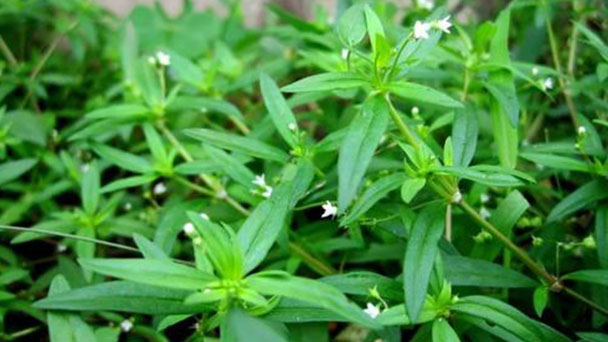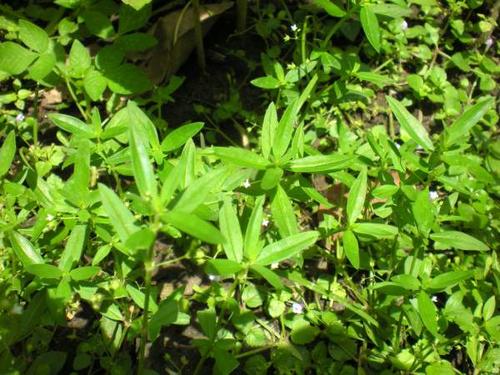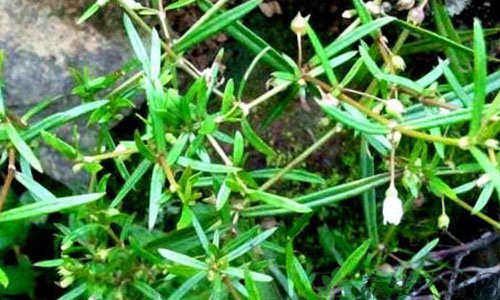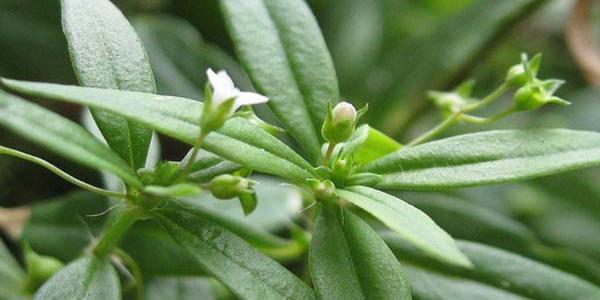Hedyotis diffusa profile
Written by Maggie
Nov 27 2020

Hedyotis Diffusa is a very common Chinese herbal medicine. It is cheap and good, but very useful. It is the holy medicine against cancer! Average person also can detoxify grass tea to drink at ordinary times. Is it true that Hedyotis Diffusa is a cancer killer? Before we know it, let's find out where Hedyotis Diffusa is.
Hedyotis Diffusa picture

Morphological characteristics and growth habits of Hedyotis Diffusa:
1. Morphological characteristics of Hedyotis Diffusa:
Leaves: opposite, sessile, membranous, linear, 1-3 cm long, 1-3 mm wide,
The top is short, the edge is often back after dry coil, above smooth, below sometimes rough. The midvein is sunken above, the lateral veins are not obvious. Stipules are membranous, base connate into a sheath, 1-2mm long, tip and tip.
Flowers: Flowers are solitary or paired in leaf axils, often with short and slightly coarsely pedicels, rarely sessile. The calyx is simply globose, 4-lobed, lobes oblong-lanceolate, 1.5-2mm long, margin lashes. Flowers are 4-numbered, solitary or twin in leaf axils. Pedicels are slightly stout, 2-5 mm long, rarely sessile or occasionally as long as 10 mm. The corolla is white, funnelform, 3.5-4mm long, apex 4-lobed, lobes ovate-oblong, ca. 2mm long, bald. It has 4 stamens, subequal, alternate with corolla lobes, filaments flat, anthers ovate, dorsal, 2-loculed, longitudinally divided. The ovary is inferior, 2-loculed.The style is 2-3 mm long, stigma 2-lobed, lobes spreading, papillary.
Fruit: Capsule oblate, 2-2.5mm in diameter, loculicidal dehiscence, calyx persistent. The calyx tube is globose, 1.5 mm long, calyx corms lobes oblong-lanceolate, 1.5 -- 2 mm long, apically acuminate, ciliate. The corolla is lobes ovate-oblong, ca. 2 mm long, apex obtuse. Seeds ca. is 10 per compartment, ribbed, dark brown after drying, with deep and coarse pits.
2. Growth habits of Hedyotis Diffusa:
Hedyotis Diffusa grows in areas 800 meters above sea level, mostly on mountain rocks, and is commonly seen in paddy fields, ridge fields and wet open land.

Propagation method of Hedyotis Diffusa:
1.Hedyotis Diffusa is often seeded and propagated. Sowing time of hedyotis diffusa can be divided into spring sowing and autumn sowing. Spring sowing can be used as a commodity, and autumn sowing can be used as both commodity and seed retention. Spring sowing is preferred from late March to early May in rice cultivation areas in south China. Spring sowing after harvest can be in situ continuous sowing, also can be left root germination cultivation.Autumn sowing takes place in mid-to-late August.An acre of land requires 1 kilogram of seed.
2. Treatment of seeds before sowing. Since the seeds of hedyotis Diffusa are small and contained in the fruit, seed treatment should be carried out before sowing to improve the emergence rate. The specific method is as follows: put the fruit of Hedyotis Diffusa on the cement floor, gently rub with rubber or cloth wooden stick, remove the peel and wax outside the seeds, and then mix the tiny seeds with fine soil several times to facilitate even sowing.
3. Sowing method. Sowing Hedyotis Diffusa can be divided into drill and broadcast. The spacing of the drill rows is 30 cm; The area will take the seeds of fine soil evenly on the strip, a pressure or a bamboo broom, pat, straw cover a layer of thin after sowing, shade during the day and night to uncover, until grow 4 leaf after emergence, shade, and make the soil loose, conducive to the emergence, watered once a spray in the morning and evening, keep strip surface moist, but do not water. Straw should be covered in the beds for autumn sowing to prevent exposure to the sun and affect the emergence of seedlings. Remove the straw when 4 leaves are planted. If roots are left for propagation in autumn, shade should not be needed.

The medicinal value of Hedyotis Diffusa:
Indications: lung heat dyspnea cough, sore throat, intestinal carbuncle, furuncles and sores, snake bite, heat and astringent pain, edema, diarrhea, inflammatory bowel disease, hot and humid jaundice. Hedyotis Diffusa is good at treating a variety of cancers.
Latest Updated
- Benefits of Bugleweed - 7 Science-backed Health Benefits
- Bugleweed Dangers & Side Effects - Is It Poisonous?
- How to Plant Evergreen Trees - What You Should Know
- When to Plant Evergreens - Grow Guide for Evergreen Trees
- 12 Wonderful Evergreen Shrubs for Your Garden
- 12 Popular Evergreen Plants with Pictures for Beginners
- When And How To Prune A Lilac Bush Like a Pro
- How to Grow & Care for Lilac Vine (Hardenbergia Violacea)
- Japanese Lilac Tree (Syringa Reticulata) Care & Propagation Guide
- Shumard Oak Pros and Cons - What to Know
Popular Articles
- Winter maintenance of Antirrhinum Majus
- How to Grow Terminalia Mantaly Tree
- How to Grow and Care for Crossostephium Chinense
- How to grow Antirrhinum Majus in spring
- Peristeria Elata (Dove Orchid) Profile: Info & Care Guide
- Underwatered Snake Plant (Sansevieria Trifasciata) - Signs And How To Fix
- How to Care for Brazilian Jasmine Plant (Mandevilla Sanderi)
- How to Grow & Care for Graptopetalum Purple Delight in Summer
- Rosa Chinensis (China Rose): Plant Growing & Care Tips
- How to Care for Baby Sun Rose (Aptenia Cordifolia)